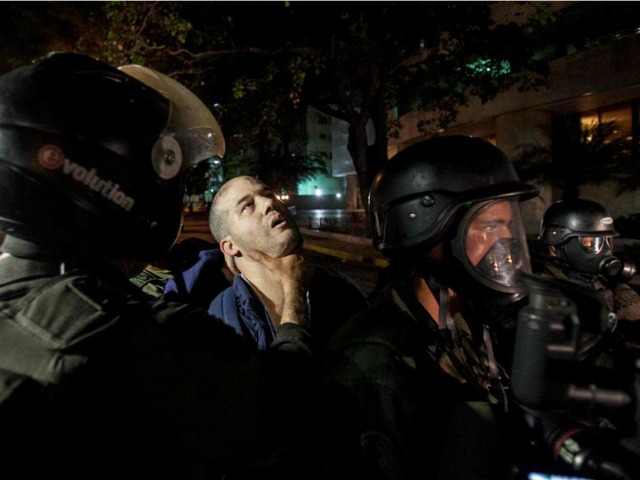
A raid on settlements populated by opposition students in Caracas has left more than 240 students under arrest in what is being called one of the most brutal repressive actions of Venezuelan President Nicolás Maduro’s regime.
Police are said to have begun their raid at 3 a.m. Thursday morning, according to Argentine news source Infobae. Minister of the Interior Miguel Rodríguez Torres said in a press conference that there was “evidence that these sites were harboring some of the most violent terrorist groups, responsible for burning police cars, using molotov cocktails, and taking up arms against security forces,” Infobae noted. Rodríguez did not corroborate his claim with any evidence of “terror” activity in the area during the press conference announcing the raid.
A local reporter in Caracas told Infobae that between 230-240 students were detained, and that many of those who lived in the settlement were the children of military personnel. The government noted that about seven hundred soldiers were sent to raid the area.
The number of individuals arrested by the Maduro regime for opposition to the socialist policies of the government reached 1,900 in March and has since surpassed the 2,000 mark. While many have been released, those that have eluded custody have reported beatings, torture, and even rape at the hands of the Bolivarian National Guard.
Students had settled in the plaza as a way of protesting the government, living in tent structures and forming anti-Chavista communities. The communities were routinely at the mercy of the National Guard, which used its physical power to confront the protesters.
Caracas has been the center of much student opposition during this current wave of protests, which began with the arrest of Popular Will opposition party leader Leopoldo López. The settlement tactics has been used in a number of squares in the capital, and Maduro has threatened raids on the most popular settlements and delivered.
The political oppression of the Maduro regime has recently received less attention than the dire economic situation of the country. Maduro has expanded rations on common goods like vegetable oil, milk, and flour to electricity and even water, as the OPEC nation struggles to keep inflation at acceptable levels and maintain trade relationships. The government’s handling of imports has also left the largest newspaper in the nation without paper, forcing it to limit its printing until the government allows them to receive a shipment from abroad.

COMMENTS
Please let us know if you're having issues with commenting.